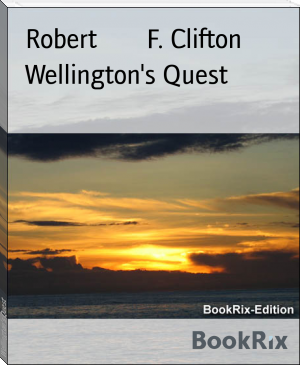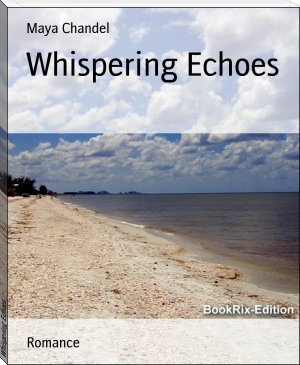Wellington's Quest - Robert F. Clifton (beach books .TXT) 📗

- Author: Robert F. Clifton
Book online «Wellington's Quest - Robert F. Clifton (beach books .TXT) 📗». Author Robert F. Clifton
Dickerson turned his head slowly and with red, bloodshot eyes, said with a faint voice, “How am I? How am I? I've lost everything Jim. My wife, my boy, my two girls. Saw them all raped and butchered. Saw my home burnt to the ground. Saw my animals slaughtered. I was in the woods, cutting fence posts when they came. There must have been fifty or sixty of them. There was nothing I could do. I keep telling myself that, but now I know that I should have fought and died with them”, said Dickerson as tears ran down his cheeks.
Jim turned and walked away. He saw Milford Wilcox leaving the command tent and walked towards him. When they met Wilcox said,”Well I met with Henry. I asked about any news about Virginia. He has no information about a Virginia Martin. But, don't despair my friend, I have arranged for us to sit in on the interrogations of the Sioux prisoners. Perhaps we may learn something. However, keep in mind that five hundred Sioux warriors and sixteen hundred women and children have been taken prisoner”.
“It's worth a chance”, said Jim.
“Also, I've made arrangements for us to sit in on the trials when they go to court”, Wilcox added.
“Good, I want to be there”, Jim replied.
“Well then, if my information is correct the interrogations are being conducted in that tent over there by that large cottonwood tree”, said Wilcox, pointing the way with his walking stick.
When they reached the tent they were met by armed guards who stood watching fifty Sioux men who sat on the bare ground. All were in chains. One by one they were taken into a large, canvas shelter where they were questioned by a Captain of the militia and a civilian who acted as interpreter and spoke the Sioux language fluently.
Wilcox handed a sentry a signed pass that had been given to him by General Sibley. After reading the permission slip the soldier permitted the two men to enter. Wilcox and Jim entered, then stood quietly listening to the proceedings.
The Militia Captain sat on a camp stool at a makeshift desk and the civilian interpreter sat next to him. A young, Sioux man approximately twenty years old stood between to uniformed militiamen both armed with rifles and fixed bayonets. The Captain looked up from the papers on the desk in front of him and asked, “What is your name?” When there was no answer the interpreter asked the question again in Sioux. The Sioux warrior touched his chest and said, “Sunkmanitu Tanka”.
“He says his name is Wolf”, replied the civilian.
“I wish to speak with you”, said the officer. The interpreter spoke to the man again in his native language.
“Tell him that many people have been killed. Men, women and children have been murdered and mutilated. Homes and buildings have been burned and animals slaughtered, ordered the Captain.
When the interpreter was finished talking the Sioux prisoner did not answer or comment.
“Did you do these things?”, asked the Captain.
After listening to the civilian the warrior spoke. “What did he say?”, asked the officer.
“He wants to know if you are hungry. He wants to know if you have plenty of food and much to eat. He says, that his stomach aches day after day from being hungry. There is no bread. There is no beef”, said the interpreter.
“Did he wage war and kill white people?', asked the Captain, aggravated now with the warrior's answers.
When the civilian was finished speaking the Sioux stood with a smile on his face,
“You see. That's his answer. Get him out of my sight”, ordered the Captain.
Wilcox and Wellington stood for the next two hours watching and listening as Sioux men were brought into the tent, one at a time. When they were questioned, some answered. Others did not, refusing. Some remained calm and silent. There were also those who were defiant. One even issued a war cry as he was led away as an answer to the inquiry.
Before the next prisoner could be brought in Wilcox stood and interrupted the proceedings. “Excuse me Captain. We are in dire need of information on one, Virginia Martin. She is eighteen years old with strawberry blond hair. Might you ask these prisoners if they know of such a woman and her where a bouts, please”.
The militia Captain gave Wilcox a stern look then, as an after thought cleared his throat and nodded his head. When the next warrior stood before him the questioning continued and as it neared the end the interpreter, speaking in Sioux said, “We look for a woman with yellow hair”. The prisoner shook his head and said, “I don't know”.
Wilcox turned to Jim and in a low voice so as not to be heard said,
“This is a complete waste of time. Even if just one of them knows anything about your Virginia he won't admit it. His loyalty belongs to the warrior society that I'm sure he is a member. He would be forced to leave the tribe if he revealed any such information. I suggest that we leave now and explore other possibilities and channels of information.”
Back at the house Wilcox and Jim sat on the front porch. Wilcox could see the signs of worry in the expression on the younger mans face.
“Jim, I know that you're anxious for some information, but you have to understand that on one hand you are dealing with a bunch of savages and on the other hand a group of survivors. The savages won't tell you anything and the survivors are still in shock and worrying about their selves and their loved ones. I'm very sure that many of them and in particular the women, don't want to recall what happened”.
“Someone, somewhere, knows or saw something”, Jim responded.
“I'm sure, but until we find that missing piece of information, I suggest that we both get to work. In your case work will be beneficial. It will take your mind off of your problems”, said Wilcox.
“How can I keep my mind on work when all I think about is Virginia?”
Jim replied.
“Listen, go to work for me and I’ll hire a Pinkerton Detective to seek and find concrete facts and information', suggested Wilcox.
“I can't ask you to do that, Milford”.
“I'm sorry. It is already done. Sidney is telegraphing them today”.
“Then, I thank you Milford. I really appreciate it”.
“You are quite welcome. Now, I propose that we rent a horse and buggy tomorrow and ride out and look at the farms. I need you to identify the rightful owners, the crops they successfully grew and the soil conditions. What do you say?”
“I say, let's get to work”, Jim answered.
The next day Milford Wilcox brought the horse drawn carriage to a halt in the yard of a now, abandoned farm. Like most of the places they would inspect this day the family house and home had been burnt to the ground. Jim stepped down from the carriage and stood looking around as if expecting to see the rightful owner appear out of the ashes.
“This farm belonged to Albert Porter. It is about twenty acres. He grew mostly wheat. Of course he had a large vegetable garden for himself and family. If you look yonder, you'll see some cabbage still growing”, said Jim pointing.
“I see. Tell me about the condition of the soil”, said Wilcox.
Jim bent over and took a handful of earth, crumbled it between his palms and released it, allowing it to fall back to the ground. “What's there to tell? It's fertile. Anything will grow here, anything that will grown in Minnesota, that is”.
“Did Mister Porter have any relatives or heirs?”, asked Wilcox.
“None that I know of”, Jim answered.
“Twenty acres you say? Interesting,” said Wilcox.
Jim climbed back into the carriage. “We'll go to Sam Peterson's place. I heard that his daughter Rebecca is missing. Sam and his wife were killed, much in the same manner as my family. The thought here a bout is that Becky is a captive somewhere”.
“What did this Peterson fellow grow?”, asked Wilcox.
“Corn mostly. Sam wasn't the best farmer in the valley, but he tried. Growing corn came easy to him, so that's what he planted, year after year”, Jim explained.
For the entire month of October, 1862 Jim examined the now neglected farms and homesteads of Blue Earth, Nicollet and Le Sueur Counties. At the same time Sidney Tozer researched property deeds, mortgages, liens and bank loans, all associated with the properties Milford Wilcox was interested in buying. These were the property of the rightful owners who were either killed or had abandoned the farms. When he could and the price was right Tozer bought these properties for Wilcox often paying less than the original real estate price.
By November 1862 the citizens of Minnesota were crying for justice and revenge. They wanted the five hundred Sioux warriors captured in various battles executed. The local and state newspapers supported their cause and politicians wanting their vote sided in with the people.
Seated in an overstuffed chair Milford Wilcox read the local newspaper. He looked up from the printed page when Jim entered the room. “Ah, Jim. I think you might find this interesting. It says here in the Mankato Record that the citizens of Minnesota are seeking the execution of the Sioux that have been captured. At the same time I have information that a new organization has been formed to deal with matters concerning the uprising. I believe it's called, “The Knights Of the Forrest”. Some say that it's a secret society. I'm not so sure. In any case, I'll have Sidney either join or place someone in their membership so I'll know exactly what they're doing”.
Jim took a seat in a chair across from Wilcox. “The word that I'm hearing is that the people want the Indians out. Not just the Sioux mind you, but all Indians. That includes the Winnebago’s in Blue Earth County”, said Jim.
“I can understand their reasoning. Some say that the Winnebago joined in the uprising”, Wilcox replied.
“I doubt it. However, it's no secret that the white's never wanted the Winnebago tribe in Minnesota. As far as I know the military hasn't produced any evidence that they were involved in the uprising. The truth is there are those who want the land the tribe was forced to settle. If you want my opinion the people who should be on trial are the traders, Indian Agents and The Bureau Of Indian Affairs. They are the one's responsible for the uprising, death and destruction that followed”, said Jim.
“I find that I must somehow agree with you. Unfortunately, the Indian is a race of people in America that has a culture with both feet stuck in the stone age. At the moment because of this war between the Union and the Confederacy all minds here are for a victory for the northern cause. However, once there is peace and reconstruction the power of industrial and financial investors will make demands. Railroads will seek to expand. They are quite content at the moment moving troops, equipment and supplies and getting paid by Congress. But, they look to the future and the Indian is in the way. Prime land, land for white settlement is now occupied by the Indian. They have to go. The future for the United States is one nation from the East coast to the West coast and no Indian can stop it”, Wilcox explained.
“That don't make it right. They will fight”, said Jim.
“And, they will lose. Right now the Union Army is the largest army in the world. So large my friend that Canada and Mexico worry about what happens after this war. Oh, I'm sure the Indian will fight. I even believe in their cause and their right to exist. However, although they can fight, they can't vote and politicians will pass laws and treaties that will





Comments (0)